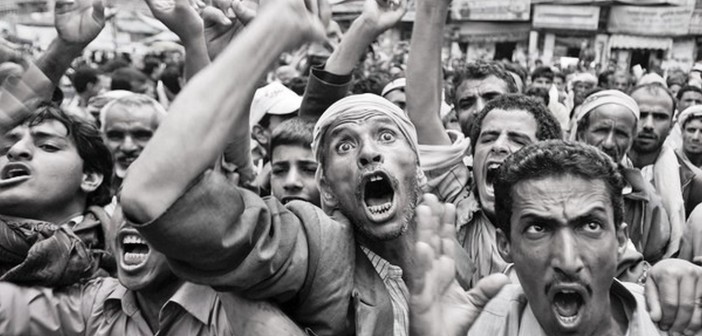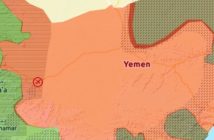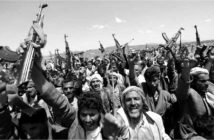Yemen continues its push to remove AQAP (al-Qaeda in the Arabia Peninsula) militants from the country, as social unrest coalesces in the capital. Ongoing battles in the southern governorates against purported militants have led to reprisal attacks in Sana’a. Soldiers, police, and foreigners have all been targeted. In one instance a French Embassy security guard was assassinated after leaving work, while sitting in traffic, in broad daylight, at a major intersection in Sana’a. Many western foreigners have left or are in the process of leaving because of the security situation; most Yemenis are anxious because of a rise in crime, opportunistic kidnappings, and extortion on the streets, although a dearth of official statistics makes the number of these difficult to verify.
Fierce battles have recommenced north of the capital between rival factions in Amran governorate. Once described as “tribal” fighting, these clashes have morphed into a series of serious battles between government forces, including the air force, and Houthi rebels. Houthis are attempting to carve out territorial niches around their power base in Saada, with increasingly bold land grabs closer to the capital. They are countered by the regular army, but also by non-Zaydi, Salafist-leaning elements, often branded ‘Islahis’. The Islah political party is accused of championing the policies of the al-Ahmar family, who are seen as the main opposition to former president ‘Ali ‘Abdullah Saleh’s party. So these ‘tribal’ battles are often proxies for sectarian and political conflict.
How much stress the central government can withstand at this particular time is unknown. Service shortages continue, including electricity, which is mostly off in the capital, returning for about 10 hours a day on the best days. A consistent lack of petrol, diesel, and cooking gas has impacted home deliveries of water, transportation of goods, and irrigation of crops. In these conditions, diesel and benzene powered generators are ineffective in alleviating the extended electrical outages.
The overall atmosphere is tense, unsettled, and depressed, though the situation is far better than open civil war, as in Syria, or elections in favor of another military strongman, as in Egypt. Yemen has not embarrassed itself, as those countries have, with predictable elections that attempt a return to the status quo prior to the Arab Spring. In fact a true sense of democracy continues to distinguish Yemen from all other countries on the Arabian Peninsula and most other countries affected by the Arab Spring. In early May the Yemeni Parliament summoned cabinet ministers over the fuel crises, demanding answers and action. More recently, it has called for a cabinet reshuffling.
Yet events in Yemen do prompt the question, ‘What happens next?’ The National Dialogue—the enlightened process of discussion that led Yemen away from civil war—has officially concluded, but what real impact has it had? The Dialogue now seems a world away, with news about militants, attacks, outages, and shortages dominating the press. Whether it can truly be considered a success is open for debate, if the situation now has deteriorated to the point that Yemenis themselves describe it as ‘chaotic, without government, without law, and dangerous’ and foreigners feel compelled to leave.
Clearly, the central government has dire security issues with which to deal immediately. The current president, ‘Abd Rabu Mansour Hadi, has made brave choices, attempting to tackle the internecine politics in the army, the general lack of safety for foreigners in the capital, and other structural issues that have led to assassinations of Yemeni military officials, as well as brazen attempts on his own life. Whether his efforts will suffice to get a quick handle on the rapidly deteriorating security situation only time can tell. While they may positively impede extremist threats, it is doubtful they will engender any real social or economic progress in the long term.
The country requires imaginative vision from its leaders now more than ever. But consumed as they are by security issues, they have scant time for considering other social dilemmas. With half of the population under 18 years of age, where will Yemen’s youth work? Even more established economies, like those in Europe and the US, have seen stagnation on this front. And how will Yemen’s cities cope with the stress of an increasingly urbanized population, when they have trouble keeping services intact for the third of the population that lives within them already?
More complicatedly, what will it mean to be Yemeni in a few years? In the best case scenario, the extremists will lose, the central government will implement a real economic vision, and the much-discussed conclusion of the National Dialogue, a federalist system, will engender confidence on a local level and trust on a national level. But will Adenis, Houthis, Sana’anis, and Hadhramis, for example, describe themselves first and foremost as Yemenis and work together to ensure peace and prosperity? While such an outcome is desirable, it appears remote right now.
Yemenis were euphorically optimistic about the peaceful, unexpected change of leadership in late 2011 and the elections, however symbolic, in early 2012. That optimism has now mostly faded, replaced in some cases by the dangerous conviction that each person must protect his own interests. While cooperation and collective action may be theoretically possible in the long term, the current climate is one wherein individual concerns predominate. In Yemen such a climate will retard progress and development, engender corruption, and contribute to economic stagnation.
Forging a cohesive and commonly accepted national identity, while simultaneously instituting viable economic development, will be the real work of Yemen’s government over the next decade. That is, assuming the southern governorates do not secede from national unity and the security situation can be triaged and ultimately improved—two huge assumptions.
Yemenis are proud of their democracy, which continues to feel like a genuine republic, despite growing sectarian threats and material shortages. The government must translate that feeling into programs which allow Yemenis to identify with their nation and to work concertedly towards nationwide prosperity.
This will be more difficult to create than infrastructure or capacity, but it is unified Yemen’s only remaining path forward.




